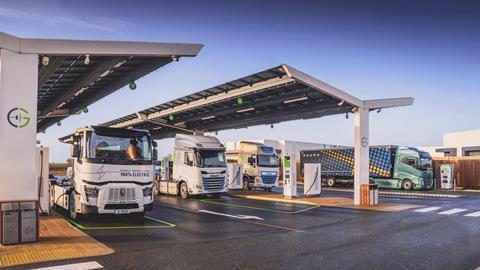A government-funded project to roll out electric HGV infrastructure across the country is expecting sign-off from landowners and network operators this month, with charging depots expected to be installed shortly.
Gridserve’s Electric Freightway programme will support and monitor a fleet of up to 140 eHGVS as well as install 200 chargers at MSAs, truck stops and commercial depots.
The project, backed with more than £62m from the department for transport and Innovate UK, aims to find out whether electric trucks are more or less expensive to run than diesel variants; what causes variations in efficiency and battery range; their environmental impact and if public charging is an economical and practical option for haulage operators.
Once the infrastructure is built, Electric Freightway, which has 33 consortium members, will run until July 2025 and then there will be a further five years of data gathering and evaluation.
Gridserve said some of the consortium members will be taking delivery of their first eHGVs this spring, while Hitachi ZeroCarbon will begin conducting a survey of drivers and fleet managers to compare their perceptions of eHGVs over time and gathering data from their initial operational experience.
James Comer, programme director at Hitachi ZeroCarbon, said: “With the UK government’s ambitious targets of ending combustion-powered heavy goods vehicles by 2035, and 2040 for heavier vehicles, now is the time to enact meaningful change and deploy the insights that data can provide.
“This project is the pioneer demonstration for the decarbonisation of the UK’s logistics industry and will tangibly test what a zero carbon future could look like.”
Gridserve’s chief vehicle officer, Sam Clarke, added: “The decarbonisation of the UK truck fleet is one of the greatest disruptors haulage and logistics has ever seen and we are now well under way through this project to catalyse material change.
“In Electric Freightway, we’ll push electric HGVs to their limits to establish just what is possible, while highlighting where there is the need for process, technological or policy innovation to enable the transition to electric.”
A report providing insight in the driving cycle efficiency of eHGVs and lessons learnt from the first installed chargers is expected in the summer.














